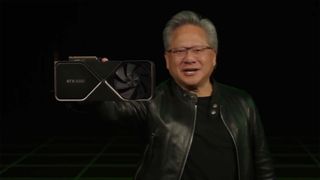Nvidia explains what you need to know about RTX 4000 GPU power demands
No, you don’t need a new power supply – but make sure you have the requisite wattage of course

Nvidia has clarified the situation around its RTX 4000 graphics cards and their demands on the power supply front, after what Team Green described as an “uptick in questions” regarding compatibility with the incoming next-gen GPUs.
And the short answer for those worrying that they might need to buy a new power supply for compatibility in an outright sense is that they needn’t worry – it’s not necessary to have a new ATX 3.0 model with PCIe 5.0 power connectors (known as 12VHPWR).
Current (no pun intended) ATX 2.0 PSUs will still work fine with any Nvidia RTX 4000 model, although that said, the power supply obviously needs to be powerful enough to handle the GPU, just the same as with any graphics card.
All this info is delivered in the form of a new FAQ, as Tom’s Hardware spotted, where Nvidia reminds us that a power adapter is supplied with next-gen Lovelace GPUs to allow ATX 2.0 power supplies to be hooked up.
So, concerning the mentioned wattage recommendations for PSUs – ATX 2.0 and 3.0 alike – what are they exactly? Well, Nvidia has stipulated that would-be RTX 4090 owners should have a power supply of at least 850W. For the RTX 4080 16GB the requirement is 750W, and it’s slightly less for the RTX 4080 12GB variant at 700W.
Analysis: Don’t forget the power-related nuances on top of all this
As Nvidia points out, these next-gen GPU power demands are not that much different to the asks made by current-gen RTX 3000 models, namely 750W for the RTX 3090 and 3080 – though obviously the RTX 4090 flagship needs a bit more juice. However, it delivers what’s promising to be a pretty big leap in performance relative to the extra power consumption.
As you may realize, these PSU requirements aren’t quite as simple as they seem on the face of it. Where it gets complicated is that you may need more wattage depending on the rest of your PC components, and principally the CPU, if you have a really beefy processor that has major power requirements of its own. (Intel’s fastest Alder Lake chip, the 12900KS, can pull around 240W at max boost for example, which may not quite be up there with a top-end Nvidia GPU, but it’s still a lot).
Get daily insight, inspiration and deals in your inbox
Get the hottest deals available in your inbox plus news, reviews, opinion, analysis and more from the TechRadar team.
On the whole, this is definitely an area where you want to err on the side of caution, and speaking of that, it’s worth noting that even PSUs which carry the same wattage rating can be of different quality. And needless to say, you don’t want to run some cheapo no-name brand PSU with a high-end Nvidia card, not that any PC enthusiast would dream of doing so. But it’s worth making the broader point that you should always stick with trusted PSU brands that’ll deliver more on the reliability and stability fronts (such as the models recommended in our roundup of the best PSUs). Even if you’re paying a bit more, we’ve long argued that the power supply is an often-overlooked component that plays a key role in the PC’s operation.
Also, we’d advise going a bit higher than the recommend wattage level anyway, if possible – it just seems sensible to have a bit of extra headroom, especially when it comes to heavyweight GPUs. Our rule of thumb is to chuck an extra 100W on top of what you think you’ll need, in a better safe than sorry kind of fashion.
Finally, it’s worth mentioning that Nvidia offers further clarification on the issue of a recently leaked email from PCI-SIG (the organization that oversees the PCI Express spec, and more) which caused folks to worry that there might be a potential risk with ATX 2.0 PSUs using 12VHPWR connectors.
This stemmed from concerns aired by PCI-SIG in the past, back in the prototyping stage, but the issue has since been resolved. Team Green noted: “Nvidia has confirmed that it was an isolated problem with a prototype connector from a specific vendor, and the supplier has since solved the issue.”
Darren is a freelancer writing news and features for TechRadar (and occasionally T3) across a broad range of computing topics including CPUs, GPUs, various other hardware, VPNs, antivirus and more. He has written about tech for the best part of three decades, and writes books in his spare time (his debut novel - 'I Know What You Did Last Supper' - was published by Hachette UK in 2013).
